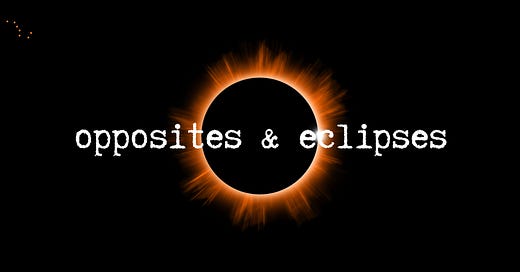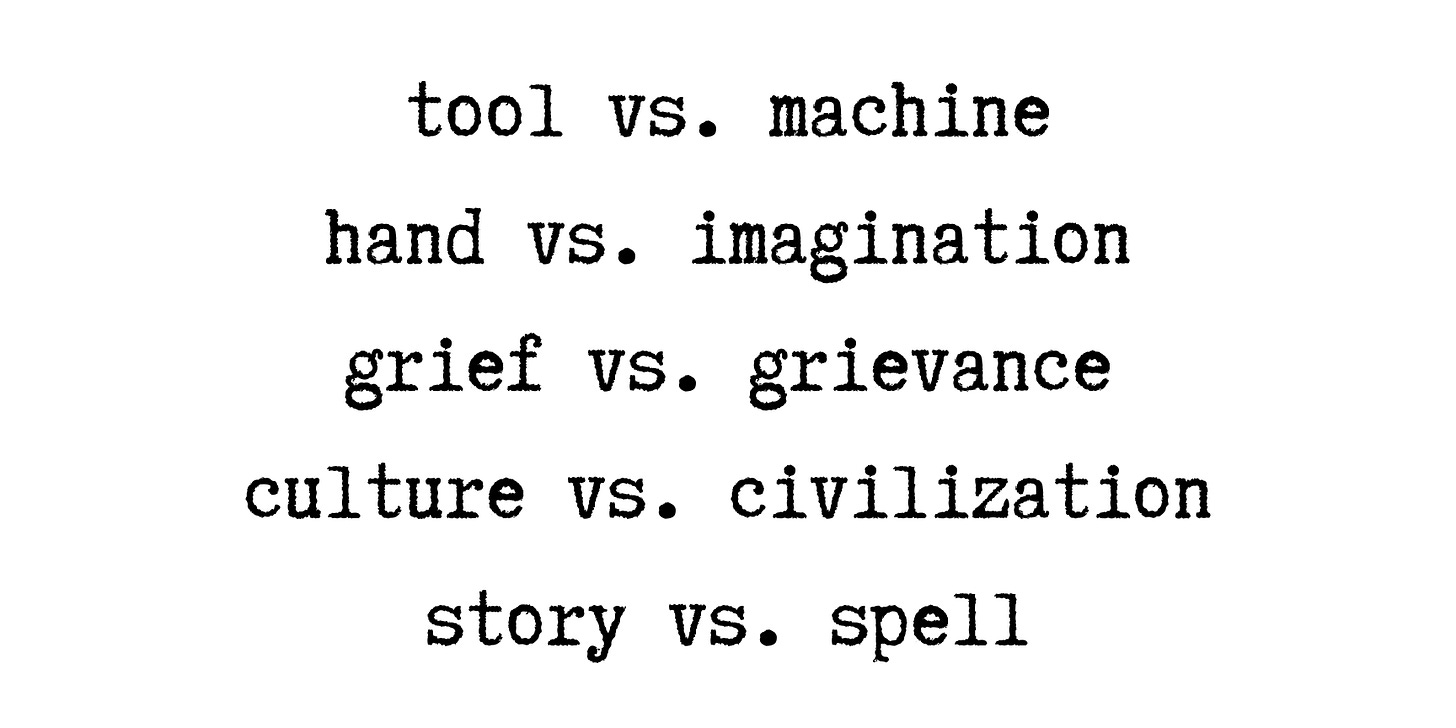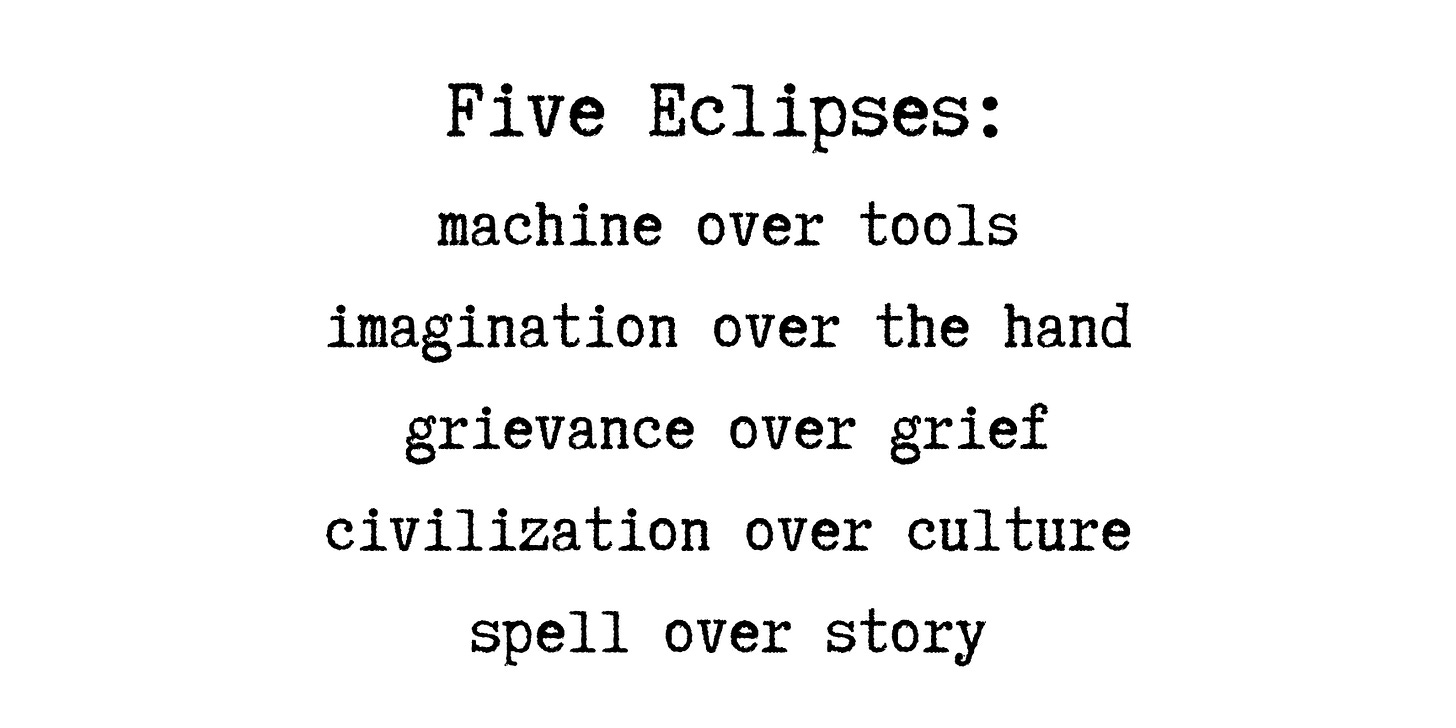I got a response to my recent series on Stories and Spells and I thought I’d take a moment to respond to some fine wonderings:
“Thank you for this beautiful series on Stories & Spells. I found this lens, the framework you explored, richly insightful and useful to my thinking. I noticed in the very first essay you wrote "The binary notion that the world divides into two opposing sides may be one of the greatest spells of our time." And then: "And so on the one hand we have: tool, hand, culture and grief. On the other hand we have: machine, will, civilization and grievance." Much of the rest of the exploration divides up all things that are of story nature vs those of spell nature. You do clarify that spell is not the "opposite" of story, they happen within stories; however in this series they represent one way of living and being in the world that appears opposed to the story way of being. The "greatest spell of our time" seems to be the foundational one that has led us to forget where spells sit in the web, and thus get lost in them.”
I think what has happened is that spell has eclipsed story. It has covered it. They’re not opposites exactly - though it can look that way when you put them side by side.
But they’re not opposites. Spell is an ‘imposite’ on stories. That’s what it seems to have become. As with the rest of them. Machine has eclipsed tool. It’s covered it. It’s dominated it. They’re not side by side. One is squarely on top to the other.
“Is civilization in all forms doomed no matter what because it arises only from spell?”
I don’t think civilization arises from spell. I think civilization arises from power. I think story arises from land. Ah. So, where did this ‘power’ come from? The clearest story of it I’ve read is in The Parable of the Tribes. No, spell didn’t begin civilization but spell allowed it to continue. Spell casting is the way we cover up the unbearable consequences of how we live.
We cast the spell of human supremacy to justify civilization.
We cast the spell of white supremacy to justify slavery.
We cast the spell or Terra Nullius, Manifest Destiny, and Empire to justify the genocide of indigenous peoples.
And on and on it goes. Spell casting is a tool to stop us seeing the world, and those in it, clearly.
To say it another way, spells (almost always cast with the tongue) are a way of silencing so we can no longer hear the voices of those we devastate and destroy, abuse and annihilate.
“What comes next in the story after we realize that the way we are doing civilization, make and use machines, and assert our will is coming from spells that are inherently unsustainable for ourselves and the entire web of life? Do all these things have to be composted on the heap of history and us to pass as a species as a giant spellbound extinction because we did not wake up in time, did not learn what we needed to learn?”
This is, of course, far beyond my pay grade to answer.
What comes next? Well, that’s up to us. Of course, there is so little ‘us’ left.
I don’t think the issues comes from how we are doing civilization any more than the issue of an abuser is in how they abuse. Civilization, defined as the growth of cities and cities being defined by people living together in a high enough concentration to require the importation of resources… that will never be sustainable. So we need to cast spells on ourselves to pretend that it is. We need to tell ourselves that slavery isn’t so bad, that the deforesting of the planet isn’t really so awful and that green tech will save us all.
Do these things need to be composted? I would say ‘yes’.
Do we need to pass as a species? Of course not. Humans are not the problem. Civilization is. Machines are. Spells are. An untethered imagination unshackled by any limits is.
Will we pass? Time will tell.
As I was reading I asked myself, what am I being invited to do about or with spells in my life, now that I'm reflecting on them? Are they inherently always sickening or even deadly? Or only if we get stuck in them beyond the point at which our learning requires us to stop fighting, face the truth, and break the spell? Are spells an inextricable part of being human, and needed in our stories? Can they be great gifts if we use story to help us go through them for our growth?
Deeply worthy questions. I wouldn’t want to rob anyone of these questions. What is the proper role of spells? Well, that’s an article in itself that I might write one day but for now let’s enthrone and admire the willingness to wonder about this. I’ll say only this: it’s probably a much smaller, humbler role than it’s had this far.
“It doesn't seem like our elder brother and sister species experience spells”
I imagine that spells, so tied to human speech, are a distinctly human phenomenon.
Are all or most of the characters and beings in story sometimes spellcasters, sometimes spellbound by others, sometimes both or different things in relation to different other beings?
Every time we open our mouths, there is a chance that a spell will be cast. This may be one reason why traditional people’s were so full of care when they spoke. The following text from the poem Magic Words by Edward Field comes from the 1921 expedition notes of Danish explorer Knud Rasmussen. Edward Field got a copy from the Harvard Library and translated it into English. I believe they refer to his time with the Inuit.
In the very earliest time,
when both people and animals lived on earth,
a person could become an animal if he wanted to and an animal
could become a human being.
Sometimes they were people
and sometimes animals
and there was no difference.
All spoke the same language.
That was the time when words were like magic.
The human mind had mysterious powers.
A word spoken by chance
might have strange consequences.
It would suddenly come alive
and what people wanted to happen could happen—
all you had to do was say it.
Nobody could explain this:
That's the way it was.
In your story/spell framework, and in the world, clearly, our species is caught up deeply in a number of spells, seemingly of our own making but also probably arising from many long long long ago (and some more recent) un-processed, un-transformed, and un-healed mass traumas. And if we do not resolve, learn from and transform through these in order to move forward in our story as the next iterations of ourselves, may lead to our own mass extinction (along with many of our elder species, some of whom are already gone from the planet because we remained spellbound).
Yes.
But the overarching story of life on Earth will continue.
Yes.
How do we identify spells and how do we break them? Or do we break them? How do we properly respond to spells when we find them? What is the proper relationship between stories and spells if not one of imposition?
Those are all other stories for another time.







story is the powder, the spell the projectile...in the case of the less discussed religious concepts , or as I lcall them ; mythogens...The story becomes binary , as monotheism and its adherents, replaced the magic of the living sentient earth, and it’s children , human ,animal, stone and tree...this was usually done in a violent way....the male off world creator god and his minions, have been ,and still are the existential threat to life... imnsho ...a new narrative with a new spell is necessary... the past is old but the future is ancient
If I am understanding correctly, spells are akin to propaganda. One of the big concepts I teach, (and learned from Buddhism) is to be a clear mirror. This means we do not see the spells, but what is actually before us with no overlay. In order to do this, we cannot be attached to any ideas (spells), so they do not influence us.
The Edgar Cayce Readings also refer to the times mentioned in the poem. It requires a great deal of integrity and honor to live with these possibilities.
But animals, plants, stones, and humans still speak the same language. People just seldom pay attention. The spell of academia has confused issues. When we come to a deep understanding of energy, we can not only more easily be a clear mirror, but also be in alignment of the truth of a particular person, place, event, or thing.
You addressed this: may lead to our own mass extinction (along with many of our elder species, some of whom are already gone from the planet because we remained spellbound.
I would like to say that gone from the planet does not mean something is gone from existence. Form and formless are we all.